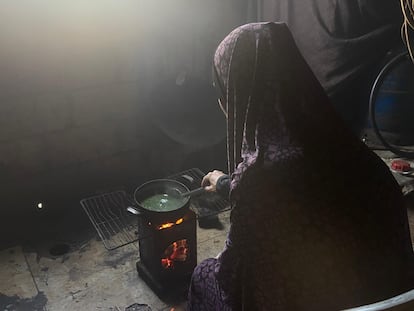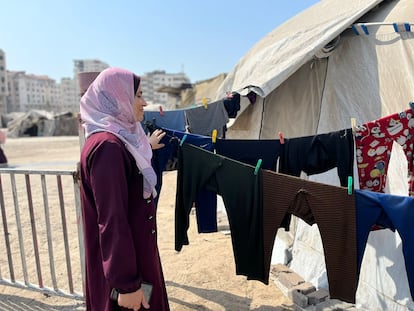Anguish consumes Gaza City in the face of the announced Israeli invasion: "Being forced to move strips us of our humanity."

Rawand al-Titar woke up Thursday morning with a feeling she hadn't had for a long time: hope. Five months pregnant, she had finally been able to find sugar, cheese, and flour in the markets of Gaza City, after Israel slightly eased restrictions blocking food from entering the Strip, which have condemned two million people to hunger each day, according to the United Nations . A total of 212 people, almost half of them children, have died of malnutrition, according to Gaza authorities. For the first time since March, al-Titar made tea sweetened with real sugar and served herself bread with real cheese. “I went to bed happy, thinking maybe there was light at the end of the tunnel,” the 32-year-old recalls. “I ate and prayed that maybe we could eat well again and that maybe—just maybe—the war would end.”
But her fragile optimism was shattered the next morning when news arrived that the Israeli Cabinet had approved plans to permanently occupy the entire Strip, starting with Gaza City. The prospect of another forced displacement sent shivers down her spine. “I felt like my heart was jumping out of my chest,” she told this newspaper in a whisper. “I kept thinking: How am I going to survive being pregnant?”

“The first thing that came to my mind was: Where will I give birth? Will it be somewhere clean? Will I still be displaced in four months? Where will I go? My house was destroyed. But if we stay and they bomb us, who will die and who will survive?” she wondered.
Despite their exhaustion, the residents of Gaza City are quietly preparing for yet another forced displacement . The prospect of renewed fighting in the area, home to nearly one million people, raises the specter of another wave of mass displacement, just as they had begun to try to rebuild their lives.
Al Titar has been forced to move seven times since the war began 22 months ago, but this would be her first time pregnant. She was supposed to have her wedding on November 30, 2023. Instead, war broke out, sending her fiancé south while she remained in the north to care for her elderly and ailing parents: her mother with cancer, her father with heart disease. “I couldn’t leave them,” she says, sitting in her family’s damaged home. “It was too difficult for them to walk long distances, so we never went south.”
Al Titar had clung to hope until the very end, especially after hearing about Egypt's role in facilitating aid distribution. But Friday's decision by the Israeli cabinet shattered those expectations. Now she believes her resilience is crumbling under the weight of the pregnancy. "I feel like I've given up." "If I weren't pregnant, I wouldn't think about leaving, but with the pregnancy, unfortunately, I have to. What matters is that the baby is born in an environment free from bombing and attacks," she says.
Living with the constant anxiety of repeating the experience is an unbearable pain.”
Fatima Al Sharqawi, resident of Gaza City
The Israeli Security Cabinet decided early Friday morning , despite internal opposition and after more than ten hours of deliberation, to redouble the offensive until it took full control of the Strip and transferred the territory to a civilian authority other than Hamas. This offensive would begin with the capture of Gaza City. The Israeli army has killed at least 60,000 Palestinians, according to sources from the Gaza Strip's Health Ministry, since the start of the invasion in October 2023. Israeli Prime Minister Benjamin Netanyahu then promised to put an end to the Hamas government and Palestinian armed groups following the attacks that killed 1,200 Israelis and kidnapped 250.
The endless escapeAccording to the UN Office for the Coordination of Humanitarian Affairs (OCHA), the more than two million residents of the Gaza Strip have endured unprecedented levels of displacement since October 2023, with many families forced to flee multiple times as fighting zones shifted across the Strip, and are now being crowded into ever-shrinking “humanitarian zones.” The agency has repeatedly warned that continued military operations would exacerbate an already catastrophic humanitarian crisis.

For 40-year-old Fatima Al Sharqawi, the cabinet's decision represents another chapter in a nightmare of endless displacement. Her journey through this war reads like a map of the Strip's destruction. On October 13, 2023, she fled her home in the Al Fairuz Towers in Gaza City, beginning a desperate escape to Al Shifa Hospital, then to a school in Khan Younis, briefly to Rafah, both in the south, and then to Deir al Balah in the center, before returning to Gaza City on February 20, 2025, during the temporary truce. A mother of four, each move has stripped away a new layer of dignity and normalcy.
“Being forced to move is unimaginable: it strips us of what remains of our humanity,” al-Sharqawi explains, his hands trembling slightly. “Living with the constant anxiety of repeating the experience is unbearable pain.”
Now, in a small rented house that has become her children's sanctuary, she faces the unimaginable prospect of losing her stability once again. Another displacement inevitably means starting over: finding cooking utensils, mattresses, blankets, and tents for shelter. “Displacement means losing the walls that protect us,” she continues. “It means living outdoors again, without clean bathrooms, struggling to find clean water. It means living among sand, insects, rodents, and scorpions, moving to an unfamiliar place.” She adds: “The situation now is more complicated than ever,” this researcher says.
A predictable decisionThe director of the local radio station Voice of the Homeland, Wissam Zagheeb, 43, maintains that the cabinet's decision was predictable, especially given the inflammatory rhetoric of far-right Israeli politicians in the days leading up to the meeting. "It will bring more harm and suffering," says Zagheeb, who has been forced to flee 14 times since the war began, settling in different neighborhoods of Gaza City, from east to west, with his wife and two children. "I fear forced internal displacement and mass deportation, as well as the destruction of what remains of homes, as happened in Rafah or Khan Yunis." "It's too early to say, but I will not leave Gaza City. I didn't leave for 21 months. I won't leave now," he says.
I won't leave Gaza City. I didn't leave for 21 months. I won't leave now.
Wissam Zagheeb, director of a local radio station
Like Zagheeb, Al Sharqawi, and Al Titar, the rest of the city's residents anxiously await whether the Israeli cabinet's decision will be implemented. They feel trapped between the impossible choice of staying in a combat zone or embarking, once again, on a journey toward an uncertain future. Al Titar's words reflect the exhaustion of an entire population. "I wish this war would end and someone would tell us what will happen to our lives."
EL PAÍS





